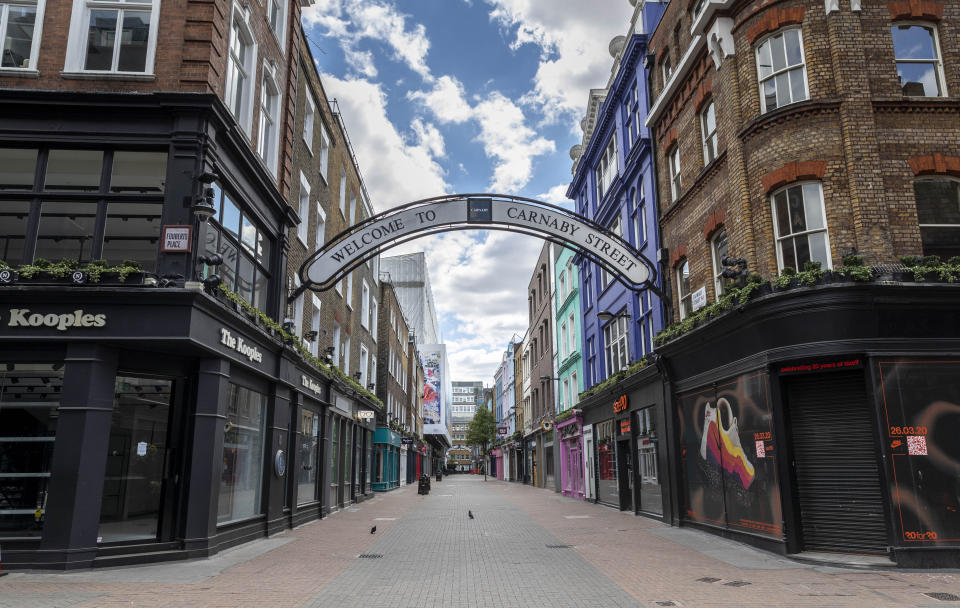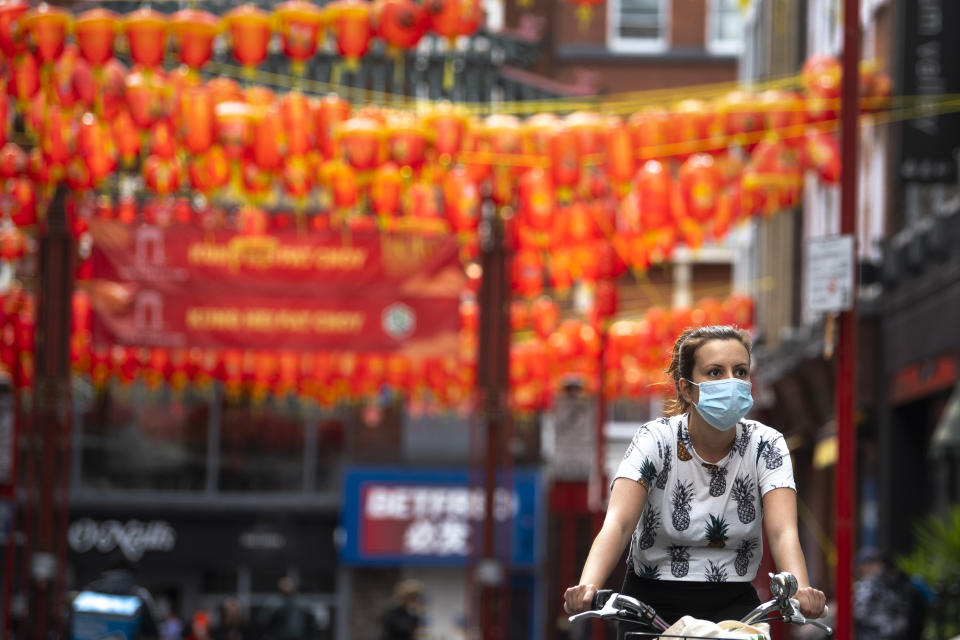Coronavirus: Chinatown and Soho landlord warns some restaurants won't survive

The head of a leading London landlord has warned some of its restaurant and retail tenants in the West End will not survive, despite the easing of coronavirus lockdown restrictions in England.
Brian Bickell, chief executive of property investment trust Shaftesbury (SHB.L), revealed it told struggling commercial tenants to simply stop paying rent when the lockdown began, with negotiations beginning more recently as many look to reopen.
He also urged the UK government to spell out swiftly when restaurants can reopen, and to cut social distancing rules to one metre to help struggling firms.
Bickell spoke to Yahoo Finance UK after Shaftesbury, which leases restaurant and retail sites around Carnaby Street, Chinatown, Covent Garden, Soho and Fitzrovia, released its half-year results this week.
READ MORE: ‘Unprecedented’ surge in residential property sales as market reopens
The update showed it collected just 27.6% of rent in its wholly-owned sites since late March as firms shut their doors. Shaftesbury’s shares slid 5.7% on Wednesday as it swung to a post-tax loss of £287.6m ($366.8m) in the six months to 31 March, versus a £38.4m profit the previous year.
It also downgraded its portfolio’s value to £3.5bn, down 7.9%, and highlighted cost-cutting measures including suspending an interim dividend and cuts to senior pay.
‘We said hold off paying rent’
Bickell said Shaftesbury had taken a “very different approach” to some other landlords who have pushed traders hard to maintain full rent payments.
He said the company had tried to be flexible with its often smaller, independent tenants, and expected it to have to keep supporting some until next year. “Their cashflow was turned off overnight, it was a real shock. We said hold off paying rent, and we’ll come back to you.”
Discussions with its 800 commercial tenants are now underway, with rent waivers for those struggling most and deferrals or use of deposit funds for others.
The company is aiming to collect just 50% of rent owed between April and September, in a sign of the severe strain facing its tenants. Bickell only expects rental income to reach pre-pandemic levels again by the middle of the next year.
“It’s been very well-received,” he said. “Nobody has yet said we’ll hand the keys back and give up.”
‘It’s a ruthless world’

Bickell said he was pleasantly surprised to hear most of Shaftesbury’s retail tenants were keen to reopen next week, when non-essential stores are allowed to do so in England.
But he does not expect them all to weather the storm. “As much as we want all our tenants to survive, they won’t. There’s always an attrition rate.”
He said customers would be “very choosy” as lockdown rules ease but the virus and economic fallout persists, on top of pre-existing challenges like ever-faster changes in fashion trends.
“It’s a bit of a ruthless world. If you’re not offering what people want, you won’t survive. That hasn’t changed,” he said.
READ MORE: Shopkeepers brace for uncertain reopening
He expects declining tourism to take a particular toll, despite a major domestic and global marketing campaign planned alongside other West End firms. “Frankly people won’t be travelling much internationally.”
Bickell believes luring back foreign visitors from countries nearest to the UK may prove easier than those further afield. He added: “Geopolitical issues that are part of the fallout from all this may hold back growth in Chinese tourism.”
Government under fire over restaurant reopening plans
Shaftesbury’s chief executive also added his voice to calls for clarity on when hospitality venues can reopen outdoor sites. There is widespread industry anger at unconfirmed reports the date could be brought forward to late June, with warnings venues need time to prepare.
Bickell said ministers had been “so unclear” on timeframes, and called for “clarity and pragmatism” from national and local leaders to help reopening restaurants.
He said deep cleaning and securing staff ahead of re-opening would take time, saying many migrant European hospitality workers had returned home.
Measures that could help the industry include relaxing licensing rules on having chairs and tables on pavements and serving alcohol without food, according to Bickell. Making them temporary may help bring residents on board, but he said everyone needed to compromise and be “less hung up” about people eating outside, a frequent local complaint.
He also said a one-metre social distancing rule, opposed by leading UK scientists, would be a “big help” for firms to operate. “We’ll realise we can manage and people will behave responsibly,” he said.
“There are three million jobs at stake here across hospitality,” he warned.
‘You can’t be creative on a Zoom call’
Some analysts predict an enduring shift away from working and living in densely populated cities among swathes of those able to work remotely and afford better homes elsewhere.
Bickell admitted he was “never a fan” himself of flexible working before, but said he had come round to its benefits at Shaftesbury during the pandemic.
He played down the idea of a drastic change in London work patterns and knock-on effects on its commercial future, however. “It’s the go-to global city, a great hub. Our team are keen to get back.
“Creative people like to be around other creative people. You can’t really be creative sitting at home on a Zoom call. And lots of people don’t have the luxury of lots of space at home.”
He also said more remote and flexible working would not necessarily hit footfall. “People might come in during the week and shop to avoid tourists.”
Yet Bickell does not expect retail and restaurant trends to eventually return to pre-pandemic norms. “Soho is always evolving. We accept that — we don’t try and freeze it in a timewarp.”

